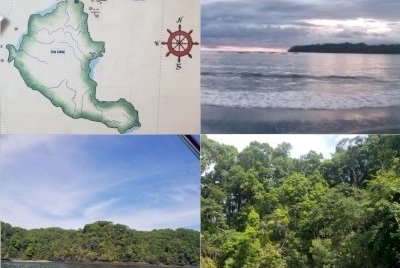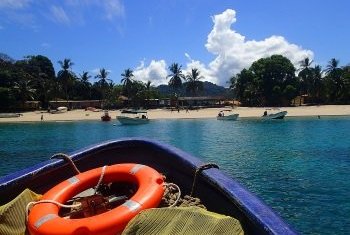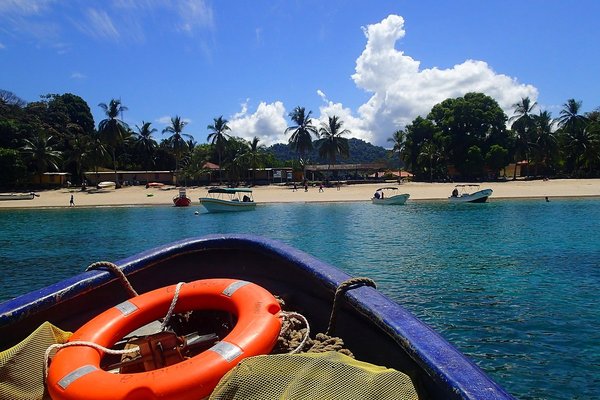Panama
Coiba National Park
Coiba National Park and its Special Zone of Marine Protection comprise Coiba Island, 38 smaller islands and the surrounding marine areas that are important for the survival and study of many species of fish and marine mammals.
After Coiba got disconnected from the mainland (some 12,000 years ago), new fauna and flora species are being formed, turning the island into a scientific laboratory with a high level of endemism. Pelagic fish and marine mammals inhabit the reefs around the island.
Community Perspective: the park can only be reached with a day trip by boat that takes you surfing, snorkeling or diving. One reviewer calls it “nature at its finest and most untouched”, the other “a disappointing experience”.
Site Info
Official Information
- Full Name
- Coiba National Park and its Special Zone of Marine Protection (ID: 1138)
- Country
- Panama
- Status
-
Inscribed 2005
Site history
History of Coiba National Park
- 2005: Inscribed
- Inscribed
- Type
- Natural
- Criteria
- ix
- x
Links
- UNESCO
- whc.unesco.org
- Official
-
- coibanationalpark.com — Coiba National Park
All Links
UNESCO.org
- whc.unesco.org — whc.unesco.org/
Official Website
- coibanationalpark.com — Coiba National Park
News Article
- Dec. 27, 2015 gcaptain.com — Luxury Cruise Ship Runs Aground in Coiba
Community Information
- Community Category
- Natural landscape: Marine and Coastal
Travel Information
Needs a Ferry
Recent Connections
-
Needs a Ferry
"It is about an hour long boat ride fro… -
Holocene
Coiba Island and the smaller islands in… -
World Heritage Forest Programme
Connections of Coiba National Park
- Geography
-
-
Archipelagos
Coiba NP consists of 38 islands which make up an archipelago.See lib.bioinfo.pl
-
Pacific Ocean
-
- Trivia
-
-
Dubbed as another WHS
"Frequently referred to as the Galapagos Islands of Central America for its abundance of rare species in both the water and on land" (wikivoyage)
-
- History
-
-
Places of Execution
"During the years that Panama was under the Dictatorships of Omar Torrijos and Manuel Noriega, the prison on Coiba was a feared place with a reputation for brutal conditions, extreme tortures, executions and political murder. Nobody knows exactly how many people were killed in the prison during this period, but sources claim that the number could be close to three hundred. " (wiki)
-
- Ecology
-
-
Mangroves
mangrove forest (Coastal WHS) -
Pelicans
Brown -
CMAR
-
Turtles and tortoises
Coiba Island also provides nesting beaches for at least four species of sea turtles [hawksbill (Eretmochelys imbricata), olive ridley, (Lepidochelys olivacea), loggerhead (Caretta caretta), and leatherback (Dermochelys coriacea)] (nom file) -
Coral
The Coiba National Park has the second largest reef in the eastern Pacific and the largest aggregation of coral reefs of any in the marine biological corridor incorporating Costa Rica, Panama, Colombia and Ecuador (nom file) -
Fish
Crit X: The property includes 760 species of marine fishes, 33 species of sharks and 20 species of cetaceans. The islands within the property are the only group of inshore islands in the tropical eastern Pacific that have significant populations of trans-Pacific fishes, namely, Indo-Pacific species that have established themselves in the eastern Pacific. -
Eagles
Crested Eagle (Official description)
-
- World Heritage Process
-
-
Perfect Inscriptions
2005
-
- Constructions
-
-
Prison
The penal colony still operates!
-
- WHS on Other Lists
-
-
Biodiversity hotspot
Mesoamerica -
World Heritage Forest Programme
-
Plant WHS not in a CPD
"The forests of Coiba Island possess a high variety of endemic birds, mammals and plants." (OUV), "858 species have been identified, with one genus endemic to Coiba (Desmotes) and three endemic species" (UNEP-WCMC)
-
- Timeline
-
-
Holocene
Coiba Island and the smaller islands in the Gulf of Chiriquí are known as landbridge islands, meaning that they were last connected to the Mainland during the end of the Pleistocene, approximately 12,000 years ago. With a direct connection to tierra firme, they shared a common flora and fauna with the continent, but since their separation, new ecological and biological processes have resulted in the readjustment of the flora and fauna (nom file)
-
- Visiting conditions
-
-
Needs a Ferry
"It is about an hour long boat ride from the coastal town of Santa Catalina or two hours from the fishing village of Boca Chica, but most travelers rely on tour operators to reach the island." (wikivoyage)
-
News
- gcaptain.com 12/27/2015
- Luxury Cruise Ship Runs Aground in…
Community Reviews
Show full reviews
What a disappointing experience. Coiba NP had potential but it is such a letdown to come here experiencing the park. The place gets glowing reviews though so what's up with that?
It's mainly from backpackers (i found mainly were German or Swedish) who just want to chill in dorms, cheap accomodations, snorkel for a day, have beers at the pool and maybe surf. Hey, that's all cool with me but that would be reviewing Santa Catalina and not Coiba. With the road now tarred and wifi reaching the village (there is even a pharmacy!) it is understandably a nice laid back place to vacation.
To get to the park itself you need to sign up for either snorkeling or scuba diving. I had prepaid 2 days diving. What follows is a rough and uncomfortable 70min long ride to the first group of islands. Those….suck. Definitely nothing spectacular to see at them. Sure they talk about the occasional whaleshark and manta sightings but the fishes are so sparse and there is no coral that it is almost like on a highway through the desert to spot vultures. You get to stop at one of these islands for surface interval and lunch and hope for some birds and mammals but nada.
Ok, what went wrong? You don't want to do daytrips. You want to do a multi day trip into the park to avoid the commute, plus you can stay inside the park and venture further to see bigger …
Keep reading 0 comments
I had the pleasure of spending an entire day surfing some of the most beautiful and untouched breaks of Coiba in the summer of 2006. After about an hour and a half boat ride from Santa Catalina, we arrived on an uninhabited paradise of jungle reaching down to the beaches and cliffs aiming towards the heavens. We explored many of the point breaks and did a bit of snorkeling near a few reefs sheltered from the larger waves arriving from the south. The highlight of the day trip including a two hour session surfing on the west side where I spent the majority of my time observing the Scarlett Maccaws flying overhead and landing on the beach only feet away! Be advised though, this island is nature at its finest and most untouched, which comes from my observation of several large shadows circling underneath my board at one point in time... My guess, bull or whitetip sharks investigating the strange creatures that had stopped by for a visit and to take in the wonders of this gorgeous island!
Keep reading 0 comments
